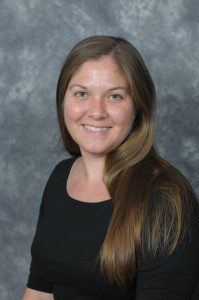Two Psychology Alums Receive Awards
Departmental News
Posted: Jun 22, 2017 - 12:00am
Two of our Ph.D. graduates, Elizabeth England Amariglio (2008) and Bethany Reeb-Sutherland (2006) have won 2017 Early Career Impact Awards. These awards are presented to early career scientists of FABBS member societies during the first 10 years post-PhD and recognizes scientists who have made major contributions to the sciences of mind, brain, and behavior.
2017 Massachusetts Neuropsychological Society Award Winner
 Rebecca England Amariglio, PhD, Harvard Medical School
Rebecca England Amariglio, PhD, Harvard Medical School
Dr. Rebecca Amariglio’s area of interest is to improve our ability to identify and track the earliest stages of Alzheimer’s disease (AD), by developing and optimizing sensitive instruments that measure subtle cognitive and functional changes. Beginning in fellowship, her research began to focus on the utility of subjective cognitive concerns as a risk factor for cognitive impairment in older individuals. Over the last five years, she has been awarded the New Investigator Research Grant by the Alzheimer’s Association and the NIH Career Development Award to further the study of subjective cognitive concerns and their association with objective cognitive testing, AD biomarkers, and longitudinal outcomes in clinically normal older individuals.
Concurrent with Dr. Amariglio’s work, the concept of Subjective Cognitive Decline (SCD) as an at-risk stage for AD has gained significant recognition in the field of aging and dementia research. Dr. Amariglio is a member of the Subjective Cognitive Decline International Working Group that has worked toward developing universal criteria for defining SCD. This group recently published a paper in collaboration with the Alzheimer’s Disease Cooperative Study, validating a specific questionnaire that measures subjective cognitive concerns of both the participant and a study partner. Her group found that the Cognitive Function Instrument tracked with longitudinal clinical and cognitive decline, as well as APOE carrier status. This study is highly relevant to AD secondary prevention trials that are in need of sensitive functional measures to quantify long-term clinical benefit in participants who are at preclinical stages of disease. Additionally, Dr. Amariglio and her group have published a paper in Neurology demonstrating that greater subjective memory complaints corresponds with advancing stages of preclinical AD. Dr. Amariglio is co-investigator of the Harvard Aging Brain Study.
Dr. Amariglio is a clinical neuropsychologist and a research investigator at Massachusetts General Hospital and the Center for Alzheimer Research and Treatment at Brigham and Women’s Hospital. She has also been recently promoted to Assistant Professor in Neurology at Harvard Medical School. She earned her doctorate in clinical psychology from the University of New Mexico, completing a pre-doctoral fellowship at the Yale School of Medicine.
2017 International Society for Developmental Psychobiology Award Winner
 Bethany Reeb-Sutherland, PhD, Florida International University
Bethany Reeb-Sutherland, PhD, Florida International University
Dr. Bethany Reeb-Sutherland’s research examines individual differences in socio-emotional behavior and the biological and environmental factors that influence such development. She has made major contributions to our understanding of the development of anxiety and various behavioral and neural mechanisms which contribute to this disorder as well as furthering our understanding of the mechanisms involved in the development of heterogeneity in social behavior during infancy and toddlerhood.
One area of Dr. Reeb-Sutherland’s research focuses on risk factors associated with the development of anxiety and the moderating role of attention processes. To address this issue, she examined measures of attention both at the neurophysiological (i.e., EEG, ERP) and behavioral levels and found that attention processes are heightened only in behaviorally inhibited adolescents with a history of anxiety when stimuli are either novel or threatening. These biases in attention are apparent earlier during both childhood and even infancy long before the manifestation of anxiety suggesting that attention processes especially those related to the processing of novel or threatening stimuli may provide insight into the etiology of anxiety.
Dr. Reeb-Sutherland’s most recent line of research focuses on furthering our understanding of underlying mechanisms of heterogeneity in infant social behavior and associated neural correlates. To better understand the underlying mechanisms involved in these associative learning processes, she examined the modulatory effect of social stimuli on learning processes in human infants during the first months of life as well as the relation between heterogeneity in early associative learning and the development of later social behavior. Results suggest that infants who more readily detect contingencies and learn the relations between stimuli in their environment display higher levels of social skill across the first year of life. Preliminary findings also suggest that this measure continues to predict language abilities into the second year of life and that these measures are moderated by mother-infant relations. Understanding more about the role of social context on learning and memory processes during early infancy may be useful in developing biomarkers for neurodevelopmental disorders, particularly those associated with social deficits such as autism spectrum disorder and Fragile X.
Dr. Reeb-Sutherland’s research has been featured in Science News and in her university’s news magazine. She has also made a number of community presentations, including to the Children’s Trust Family Expo. She also engages and trains many under-represented individuals in the STEM fields at both the graduate and undergraduate levels. Currently 90% of her undergraduate research assistants are Hispanic females, and two of three graduate students are Hispanic females.
Dr. Reeb-Sutherland is an assistant professor of psychology at Florida International University. She completed a fellowship at the Child Development Laboratory at the University of Maryland after earning her doctorate in psychology at the University of New Mexico.
